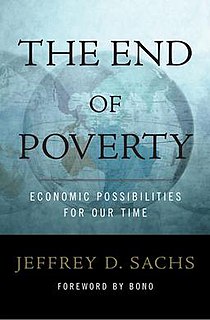Developing world
 | This article may be unbalanced towards certain viewpoints.(June 2014) |
In the developing world, many factors can contribute to a poverty trap, including: limited access to credit and capital markets, extreme environmental degradation (which depletes agricultural production potential), corrupt governance, capital flight, poor education systems, disease ecology, lack of public health care, war and poor infrastructure. [2]
Jeffrey Sachs, in his book The End of Poverty , discusses the poverty trap and prescribes a set of policy initiatives intended to end the trap. He recommends that aid agencies behave as venture capitalists funding start-up companies. Venture capitalists, once they choose to invest in a venture, do not give only half or a third of the amount they feel the venture needs in order to become profitable; if they did, their money would be wasted. If all goes as planned, the venture will eventually become profitable and the venture capitalist will experience an adequate rate of return on investment. Likewise, Sachs proposes, developed countries cannot give only a fraction of what is needed in aid and expect to reverse the poverty trap in Africa. Just like any other start-up, developing nations absolutely must receive the amount of aid necessary (and promised at the G-8 Summit in 2005 [3] ) for them to begin to reverse the poverty trap. The problem is that unlike start-ups, which simply go bankrupt if they fail to receive funding, in Africa people continue to die at a high rate due in large part to lack of sufficient aid.
Sachs points out that the extreme poor lack six major kinds of capital: human capital, business capital, infrastructure, natural capital, public institutional capital, and knowledge capital. [4] He then details the poverty trap:
The poor start with a very low level of capital per person, and then find themselves trapped in poverty because the ratio of capital per person actually falls from generation to generation. The amount of capital per person declines when the population is growing faster than capital is being accumulated ... The question for growth in per capita income is whether the net capital accumulation is large enough to keep up with population growth.
Sachs argues that sufficient foreign aid can make up for the lack of capital in poor countries, maintaining that, "If the foreign assistance is substantial enough, and lasts long enough, the capital stock rises sufficiently to lift households above subsistence."
Sachs believes the public sector should focus mainly on investments in human capital (health, education, nutrition), infrastructure (roads, power, water and sanitation, environmental conservation), natural capital (conservation of biodiversity and ecosystems), public institutional capital (a well-run public administration, judicial system, police force), and parts of knowledge capital (scientific research for health, energy, agriculture, climate, ecology). [5] Sachs leaves business capital investments to the private sector, which he claims would more efficiently use funding to develop the profitable enterprises necessary to sustain growth. In this sense, Sachs views public institutions as useful in providing the public goods necessary to begin the Rostovian take-off model, but maintains that private goods are more efficiently produced and distributed by private enterprise. [6] This is a widespread view in neoclassical economics.
Several other forms of poverty traps are discussed in the literature, [7] including nations being landlocked with bad neighbors; a vicious cycle of violent conflict; subsistence traps in which farmers wait for middlemen before they specialize but middlemen wait for a region to specialize first; working capital traps in which petty sellers have inventories too sparse to earn enough money to get a bigger inventory; low skill traps in which workers wait for jobs using special skill but firms wait for workers to get such skills; nutritional traps in which individuals are too malnourished to work, yet too poor to afford sustainable food; and behavioral traps in which individuals cannot differentiate between temptation and non-temptation goods, and therefore cannot invest in the non-temptation goods which could help them begin to escape poverty.











